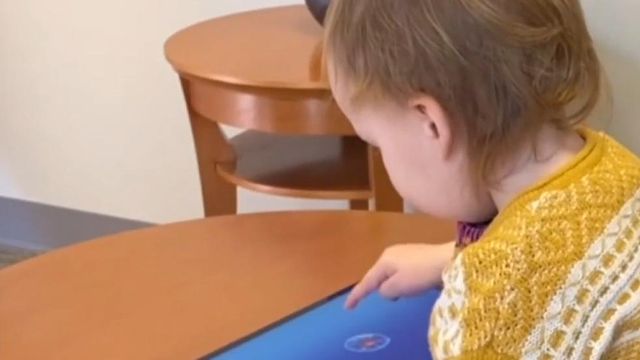Duke app could be groundbreaking for detecting autism in children
Researchers at Duke have created an app that can detect autism in children who are 18-to-24 months old.
The app uses artificial intelligence to show movies to kids and record their responses. Certain behaviors and movements can be predictive of autism.
The app should be used in conjunction with a parental questionnaire. It can be downloaded on smartphone or tablet.
Researchers said this will help get more kids into early intervention programs and resources.
"The whole purpose behind this is getting kids into early intervention as soon as possible and we don't want to miss kids," said Geraldine Dawson, Duke professor of psychiatry and behavioral sciences.
The American Academy of Pediatricians requires children to be screened for autism. That's done through a parent questionnaire. Researchers at Duke University have created an app to screen for autism, parents just need a smartphone or a tablet.
This bubble popping game is actually assessing a young girl for autism.
Duke researchers created the app, called SenseToKnow. It uses artificial intelligence to record the child's responses to the videos. It analyzes things like head and mouth movements, facial expressions, even how often the toddler blinks.
It's highly accurate.
"The human eye can not detect these subtle indicators that can end up being highly discriminative in the diagnosis of autism," Dawson said.
Dawson said the current way of assessing for autism, a questionnaire, isn't sufficient.
"The problem is that this questionnaire is not as accurate as it should be, particularly for children of color and for girls," Dawson said. "It's missing kids."
"My children they were diagnosed at ages three and four," Danai Fannin. an associate professor at North Carolina Central University.
Danai Fannin said the app could have helped her identify autism in her children sooner.
At the time they were diagnosed, she was a postdoctoral student at UCLA, studying autism intervention.
"So it was hard for even me, someone who works with the children a lot, to tell for sure," Fannin said.
Researchers said the app would be most effective used with the questionnaire to catch autism early.
"The whole purpose behind this is getting kids into early intervention as soon as possible and we don't want to miss kids," Dawson said.
Researchers said they have one more pilot study to get through before the app can be broadly marketed.











